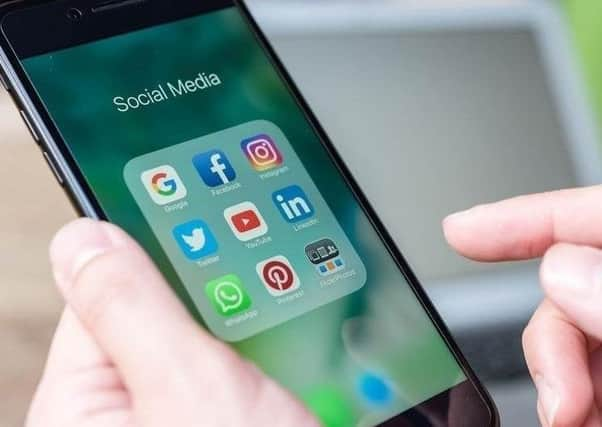Jayne Dowle: Parents have duty to start policing of social media use at home


Speaking at a Manchester conference to commemorate the 70th anniversary of the NHS, he called on the “web giants” – companies such as Google and Facebook – to take more responsibility for the pressures they place on children and young people.
“We have to ask some pretty searching questions around the role of technology companies, social media and the impact that it is having on childhood,” he said. “This cannot be a conversation that is simply left to the NHS to pick up the pieces for an epidemic of mental health challenge for our young people.”
Advertisement
Hide AdAdvertisement
Hide AdThe Royal Society of Public Health has linked the use of social media with higher levels of anxiety and depression and feelings of inadequacy. Given its nebulous nature, in that it’s not actually “real”, it’s difficult for researchers to directly correlate social media use with this proliferation in mental health conditions.
However, when official figures suggest that one child in 10 aged between five and 16 in Britain now has a clinically diagnosable mental illness, and UK rates of hospital admission for anorexia is girls under 18 has doubled since 2010, questions will be asked.
And the finger, inevitably, points to social media. The pressure to look, act and express yourself in a certain way can just be too much for some young people. However, from a parental point of view, it’s difficult to see what Google and Facebook could actually do, expect plaster warnings and block content deemed offensive.
Let’s take YouTube, for example. Footage which might contain foul or abusive language, or overtly sexual images, will usually flash up an age warning sign. But nine times out of 10, it won’t stop your teenager watching it.
Advertisement
Hide AdAdvertisement
Hide AdHow does Simon Stevens expect these companies to police the every move of every young person? A “warning, explicit content” sign won’t stop your daughter being bullied online or your son investigating the dark web in search of pornography.
However, what might help is if you have full and frank discussion with your son or daughter about the internet. And not just one big talk, like the “periods” talk or the “condoms” talk. It needs to be an ongoing conversation in which you lead the way. It should be informed by developments in technology and cyber-security, and led by relevant news stories and issues which may arise.
It always surprises me to hear parents happy to acquaint themselves with every last tedious detail of GCSE maths or physics to cram their child for an exam, yet these same parents look aghast if you mention Snapchat. “Oh that,” they will say. “I can’t get my head around all that rubbish.”
Well, frankly, as a parent, you should. Between us, my partner and I keep a distanced eye on all my daughter’s social media accounts, including Snapchat. And you know something? I think she is glad that we do. We’re like a security blanket in the background. We don’t read every message or chase up every link, but we do know that she is safe and exploring things which are appropriate for her age.
Advertisement
Hide AdAdvertisement
Hide AdAnd if things did go awry, we wouldn’t hold back. One hint of bullying, “fat-shaming” or such-like and we would be straight onto the perpetrator, and their parents, to stamp it out.
I also think that parents should look to their own behaviour online. If you document your life, fancy holidays and weight-loss “journey” in a Facebook feed which reads like an ode to vanity, don’t expect your daughter to grow up with a balanced view of her own body image.
Likewise, if you set up secret messaging groups with certain friends in order to talk about other friends – and yes, I know grown women who do this – don’t be surprised if your children use social media as a weapon too. And if you’re a keyboard warrior who uses Twitter to espouse extreme political or social views, rein it in, for the sake of your children.
Simon Stevens is right to be concerned. The treatment of rising numbers of young people for mental health conditions is costing his NHS dear. And such problems can lead to debilitating long-term issues; chronic lack of self-confidence, personality disorders, substance misuse and the inability to cope with the rigours of the world, including raising children and holding down a steady job. This not only has the potential to affect families, it could also impact generally on society, employment and subsequently the national economy.
Advertisement
Hide AdAdvertisement
Hide AdIn which case, it is far too important to be left to the likes of Google and Facebook to sort out. If we want to tackle the corrosive effects of social media, it’s got to start at home, not in cyberspace.